Key takeaways:
- Geopolitical dynamics significantly impact mining investments, with political stability influencing resource availability and market decisions.
- Investments in mining contribute to economic resilience and job creation, crucial during economic downturns while supporting local communities.
- Political instability can alter investment landscapes, leading to uncertainty and potential losses, necessitating adaptive strategies and proactive engagement.
- Forming strategic partnerships and staying informed about geopolitical trends enhances investment strategies and helps manage risks in volatile environments.
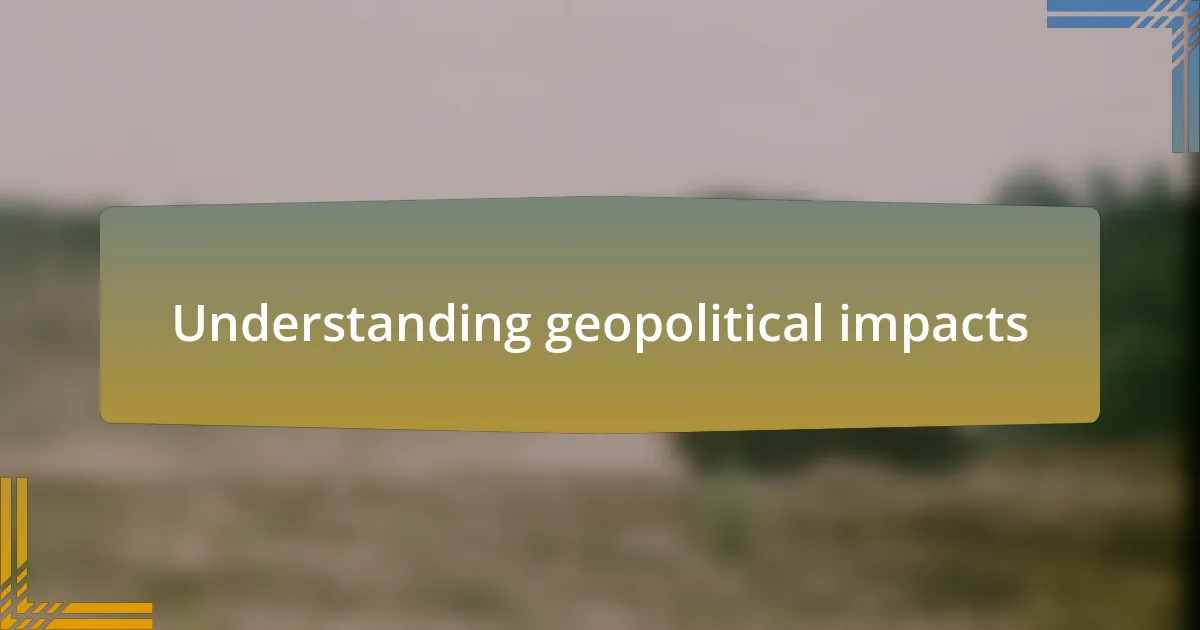
Understanding geopolitical impacts
Geopolitical dynamics play a crucial role in shaping the landscape of mining investments. I recall a time when the rise of tensions in a specific region caused spikes in commodity prices almost overnight. Have you ever thought about how a single political decision can ripple through global markets and affect where companies choose to invest?
When I think about geopolitical influences, I often consider how resource availability can be tightly linked to political stability. Countries rich in minerals like lithium or cobalt, essential for technology, can find themselves at the mercy of international negotiations and political maneuvering. Isn’t it fascinating how the political climate not only affects mining operations but also the broader economy in ways we often overlook?
The interconnectedness of geopolitics and mining can also result in unexpected opportunities. For instance, investors keenly watching diplomatic relations might seize the chance to enter markets that suddenly become accessible due to newfound agreements. Have you ever pondered how strategies need to adapt in response to shifts in the global political arena? It’s a constant dance, and those who understand the rhythm can stay ahead of the game.
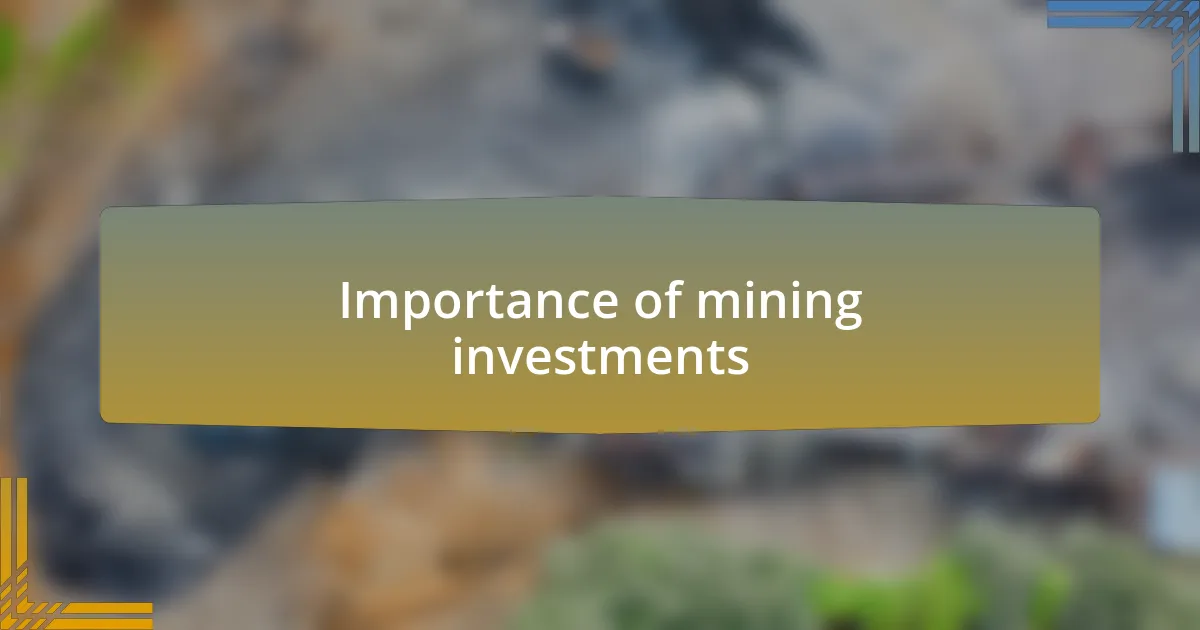
Importance of mining investments
Investing in mining is not just about securing resources; it’s about building economic resilience. I remember a project we undertook in a politically volatile region. The risk was substantial, but the reward was a substantial return when the political climate stabilized. Have you ever realized how investments in mining can help nations weather economic storms?
Moreover, mining investments play a fundamental role in job creation and technological advancement. During an economic downturn, I witnessed communities reliant on mining flourish because new investments brought in not only jobs but also training and modern equipment. Isn’t it compelling how mining can become a cornerstone for both local economies and national development?
Lastly, the global demand for essential minerals is growing, with electric vehicles and renewable energy production driving this demand. I often think about how investments in mining aren’t just about profit; they also contribute to sustainable futures. Have you considered how these investments can help transition us to greener technologies while also supporting the communities in which they operate? This balance between economic gain and ethical responsibility is vital as we navigate the complexities of modern mining.
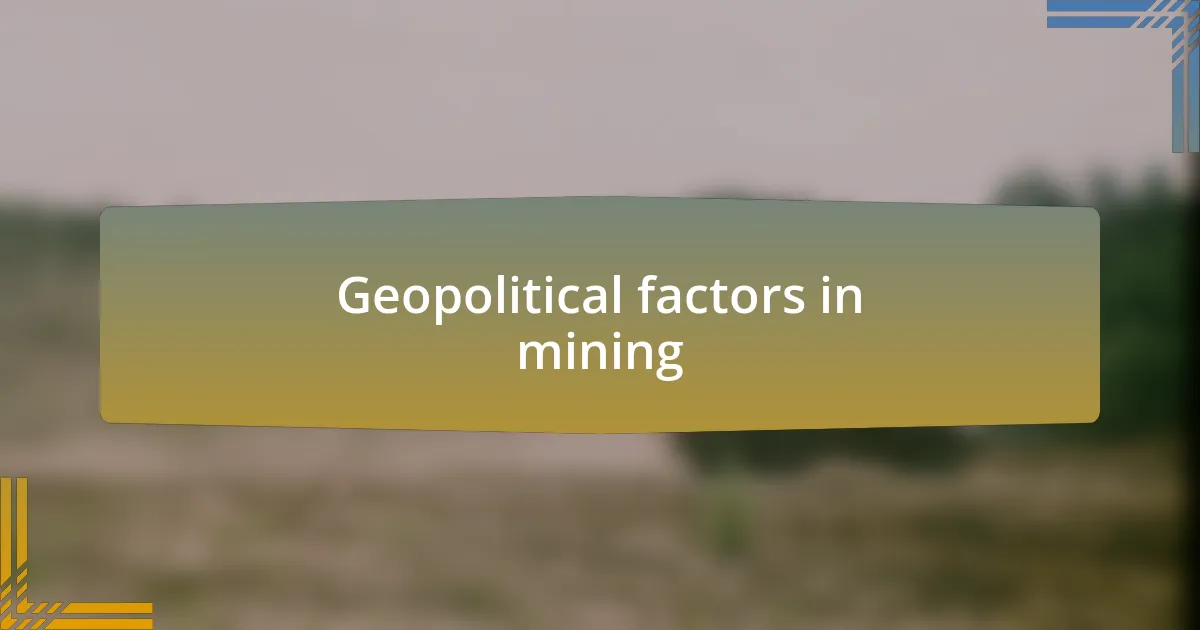
Geopolitical factors in mining
Geopolitical factors heavily influence mining operations and investments. I remember working alongside a team that was closely monitoring changes in government regulations and international trade agreements. When the political landscape shifted unexpectedly, it directly impacted our supply chain—underlining how essential it is to stay informed about the global political climate. Have you ever thought about how a country’s stability can affect your investment decisions?
In my experience, the relationship between nations can create both challenges and opportunities within the mining sector. For example, when tensions rise between countries, sanctions can disrupt the flow of vital minerals, creating volatility in prices and availability. I often ponder how these geopolitical dynamics can shift the landscape for companies operating in regions at risk for conflict—it’s a balancing act that requires vigilance and adaptability. How do you prepare for such uncertainties?
Furthermore, resource-rich nations often face the dilemma of balancing their geopolitical leverage with the need for foreign investments. I’ve seen firsthand how countries with valuable mineral deposits sometimes limit access to ensure maximum benefit for their citizens. This makes it critical for investors to build strong relationships and demonstrate corporate social responsibility. What strategies do you believe are effective in fostering trust in these contexts?
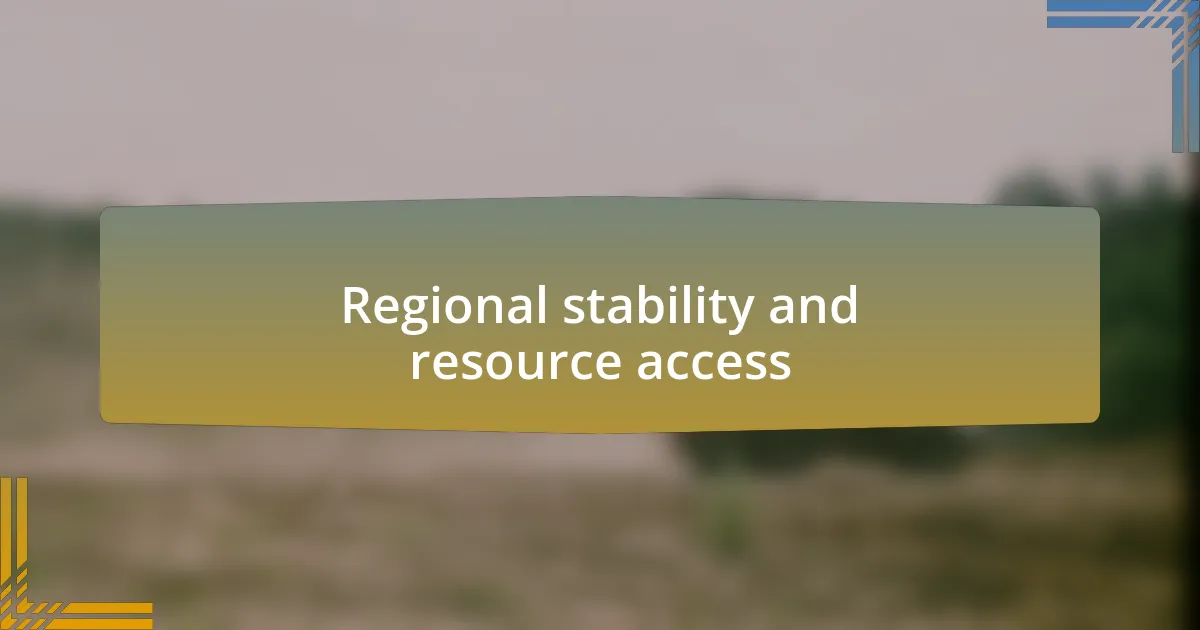
Regional stability and resource access
The stability of a region can profoundly impact access to mining resources. I recall a project I was involved in within a politically volatile area—one minute, we had the green light for exploration, and the next, escalating tensions led to an abrupt halt. It’s fascinating how quickly a region’s stability can pivot, illustrating that investors must constantly assess not just the physical terrain, but the political landscape as well. How ready are you to pivot in the face of such uncertainty?
When examining resource access, I’ve seen firsthand how countries rich in minerals often wrestle with external pressures and internal governance issues. For instance, in one country where I worked, foreign mining firms faced significant barriers due to restrictions imposed by the government, aimed at maximizing local gains. This situation taught me that understanding the complex interplay between local policies and international needs is essential for successful investment strategies. Have you ever considered how these dynamics could shape your next investment decision?
Moreover, regional stability directly influences the operational costs and logistical challenges that mining companies face. I remember coordinating shipments in an area affected by border disputes—transporting materials became an exercise in patience and negotiation. This experience highlighted the importance of not just having access to resources, but also ensuring reliable delivery channels. What measures do you think are necessary to mitigate such risks in unstable regions?
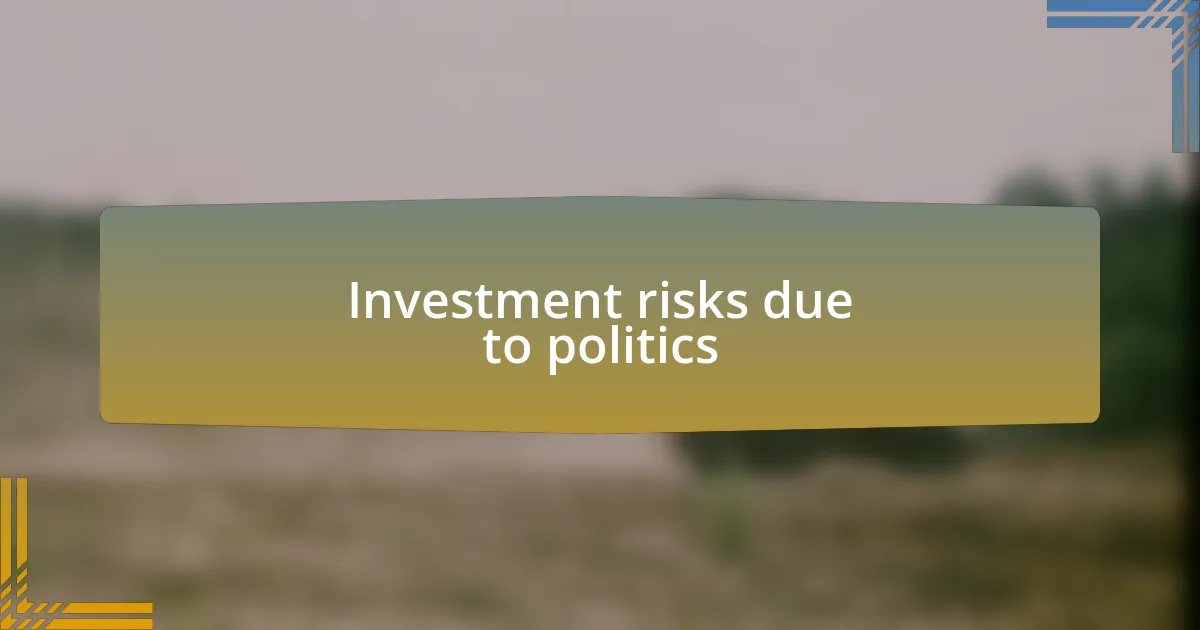
Investment risks due to politics
Political instability can dramatically alter the investment landscape for mining ventures. I recall a project in a region where an unexpected change in government led to the revocation of previously granted permits. This left investors scrambling to either adapt their strategies or withdraw entirely, reflecting how one political shift can shake confidence and trigger a wave of uncertainty. So, I ask you, how prepared are you to reassess your commitments in such unpredictable environments?
As I’ve navigated through these politically charged waters, I’ve experienced firsthand the chilling effects of sanctions and trade disputes on operational feasibility. Once, I worked with a mining company that was poised for expansion when rising international tensions suddenly made sourcing equipment from foreign suppliers nearly impossible. It was a stark reminder that global politics can tighten the supply chain like a vice. How do you strategize around these external pressures to safeguard your investments?
Taking a broader view, I’ve noticed that politically motivated violence or civil unrest can undermine not only security but also investor sentiment. At one site, workers faced threats during local protests, leading to significant production downtime. This experience left me with a deep understanding of how crucial it is to proactively engage with local communities and address their concerns. What steps do you think are necessary to build trust and ensure safety in such charged atmospheres?
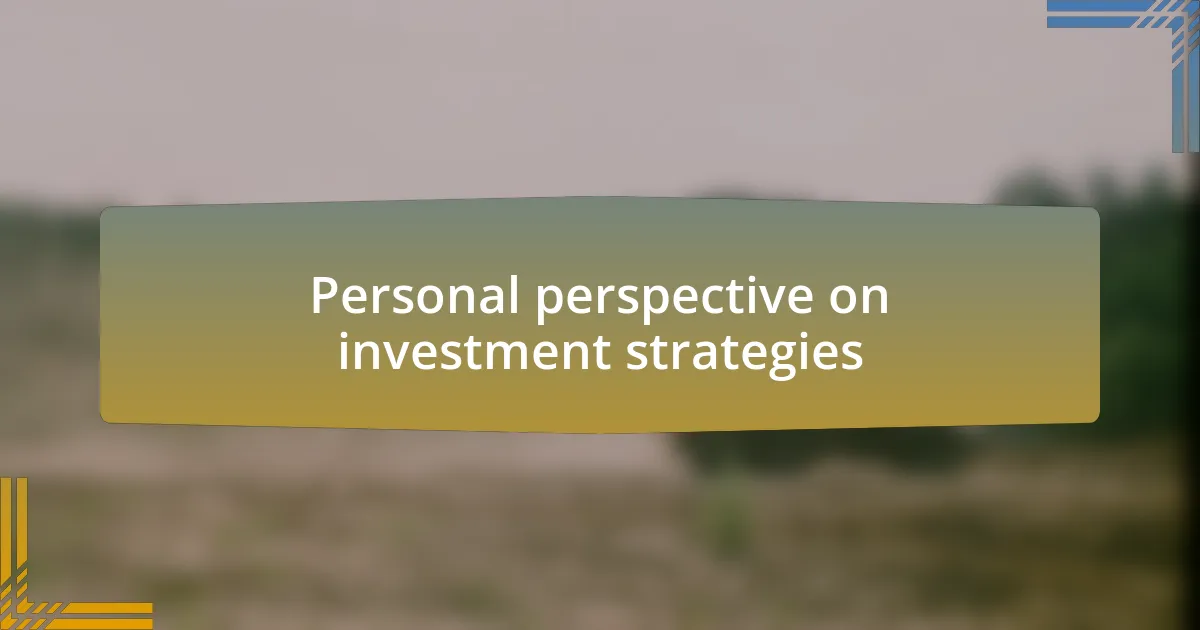
Personal perspective on investment strategies
When I think about investment strategies in mining, I often reflect on the importance of being adaptive. In one instance, I had to pivot an investment plan mid-project because new regulatory measures emerged unexpectedly. It’s in these moments that I learned the value of having a contingency plan. So, I wonder, how often do you consider the flexibility of your investment portfolios in the face of changing legislation?
Additionally, I’ve found that staying informed about geopolitical trends can provide a competitive edge. There was a period where I dedicated time to tracking emerging markets and understanding their socio-political climates. This investment of time led to opportunities that more reactive investors missed. I’m curious—how do you ensure you remain vigilant about the geopolitical landscape affecting your investments?
Moreover, I’ve come to appreciate the role of forming strategic partnerships as a proactive investment strategy. During a challenging phase in a project, aligning with local stakeholders not only helped mitigate risks but also fostered a sense of community ownership. This taught me that investing in relationships can be just as crucial as the financial aspects. Do you actively seek partnerships that could strengthen your position in uncertain environments?
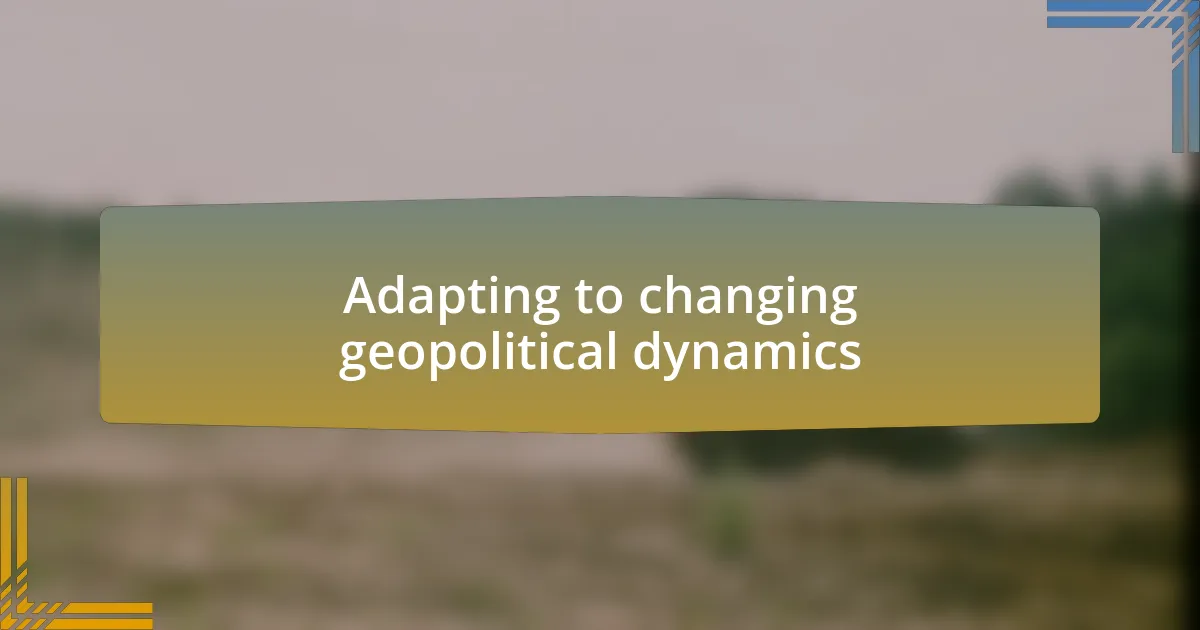
Adapting to changing geopolitical dynamics
Understanding and adapting to shifting geopolitical dynamics is essential in mining investments. I recall a time when international tensions escalated, impacting the supply chain for a crucial mineral I was involved with. It was a stark reminder that global events can ripple through local operations, influencing everything from costs to timelines. Have you ever found your project timelines unexpectedly disrupted due to external geopolitical factors?
In my experience, proactivity is key. For instance, I once proactively consulted with local experts when trends suggested a government shift that could affect my investments. Their insights were invaluable, revealing potential regulations that I hadn’t considered. This proactive approach not only fortified my strategy but also deepened my appreciation for the local context in which I was operating. How often do you seek out local perspectives to inform your investment decisions?
Lastly, I find it vital to remain versatile in the face of geopolitical uncertainty. During a market downturn triggered by geopolitical unrest, I had to reassess not just the potential returns, but also the ethical considerations behind the investments. This self-reflection pushed me to explore sustainable alternatives that offered resilience and aligned with evolving public sentiment. Are your investment choices adaptable enough to withstand not just economic fluctuations, but also ethical scrutiny?